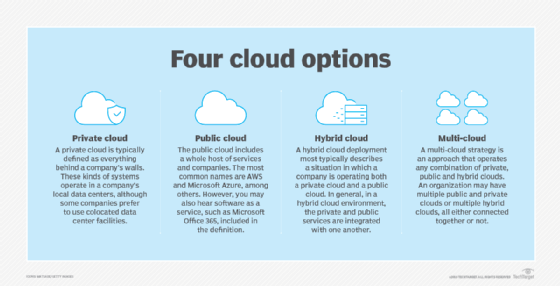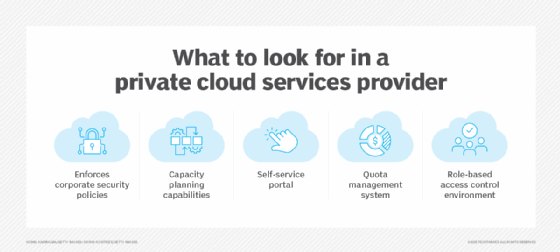
Getty Images/iStockphoto
Explore the top 12 private cloud providers of 2025
There are many factors to consider when choosing a private cloud platform. Explore these popular providers to see which one suits your business best.
Few technology projects evoke as much excitement -- and anxiety -- as a private cloud. An organization that can deliver resources, services and applications with high levels of control and self-service can find many opportunities for business innovation and transformation.
However, private clouds can be notoriously complex and demanding, especially when a business tries to implement private cloud technology in-house. Fortunately, there are many alternatives available today that can provide powerful DIY solutions, along with proven and convenient private cloud platforms as a service.
What is a private cloud?
A private cloud is a cloud computing environment dedicated to the exclusive use of a single organization. This cloud deployment model is intended to deliver resources, services and applications to users, while supporting a high level of self-service, automation, flexibility and user autonomy -- much like a public cloud.
However, private clouds can have noteworthy limitations. Since private clouds are typically provisioned from an organization's existing IT infrastructure, the amount of scalability and number of services available to users can be far more limited than public clouds. Even when private cloud capabilities are delivered through third-party providers, the amount of scalability and scope should be considered carefully.

Why choose a private cloud platform?
Organizations choose a private cloud deployment model when they need a combination of characteristics that are beneficial to the business, including the following.
Security
A private cloud offers a dedicated single-tenant computing environment, so there is little risk associated, as opposed to multi-tenant public cloud environments. The organization sets the security posture and configurations needed to ensure appropriate data protection and security for the private cloud environment. A private cloud is well suited to business environments that require tight security around business data and applications.
Customization
A private cloud often supplies a limited number of resources, services and a fixed set of applications that are available to users on demand. The business can choose any combination of these assets and select how they are requested by -- and provided to -- the user base. In effect, a private cloud can deliver the look and feel desired by the business.
Control
A private cloud enables a business to exert direct control over the behavior and operational characteristics of the computing environment. This level of control may be needed to maintain appropriate business governance and regulatory compliance. For example, private clouds are popular with government agencies, financial institutions, healthcare organizations and businesses with mission-critical operations.
Top private cloud providers and software
It's an embarrassment of riches for IT pros considering paid or open source private cloud platform options. Some platforms, such as Azure Stack Hub, are unique to specific vendors and pose some risk of vendor lock-in. Other vendors offer private cloud as a service, often partitioning a portion of the provider's public cloud infrastructure and dedicating that portion to a customer for its single-tenant use as a private cloud.
Finally, there are software frameworks, such as Apache CloudStack, that organizations can use to cobble together a private cloud within their existing local data center. Selecting a private cloud platform depends on many factors, including users' current data center platforms, hybrid cloud goals -- if any -- security and support needs, current IT staff expertise and cost limitations.

Here is a list, ordered alphabetically, of top private cloud service providers and software options according to market research.
Apache CloudStack
An open source IaaS cloud platform, Apache CloudStack offers a comprehensive management system that features usage metering and image deployment. It supports hypervisors such as Kernel-based Virtual Machine (KVM); VMware vSphere, including ESXi and vCenter; XenServer/XCP; and XCP-ng. Beyond its own API, CloudStack also supports AWS APIs and Open Cloud Computing Interface from the Open Grid Forum.
CloudStack offers scalable infrastructure with high availability and handles features like tiered storage, Active Directory integration and some software-defined networking. As with other open source platforms, it takes a knowledgeable IT staff to install and support CloudStack.
Azure Stack Hub
Azure Stack Hub is part of Microsoft's Azure Stack portfolio and enables organizations to run apps in an Azure environment located on-premises, which can deliver Azure services within a data center. Use consistent tools, environments and applications, and easily transfer them between Azure and Azure Stack Hub. Stack Hub provides an autonomous private cloud that runs independent of internet connectivity and does not require the Azure public cloud. However, the two can be connected seamlessly to create an Azure hybrid cloud.
Azure Stack, similar to its public cloud services, offers pay-as-you-use pricing.
Eucalyptus
Eucalyptus software provides a modular, open source, private IaaS cloud platform for CentOS, Fedora and Ubuntu environments capable of building AWS-compatible clouds. Eucalyptus is API-compatible with Amazon EC2, S3, Identity and Access Management, Elastic Load Balancing, Auto Scaling and CloudWatch services, enabling Eucalyptus to create hybrid clouds between local and AWS resources.
Eucalyptus offers a free community edition.
HPE private cloud
HPE private cloud offerings combine infrastructure and software to form a private cloud delivered through the HPE GreenLake platform. GreenLake enables private clouds to support workloads and data in data centers, at the edge, in colocations and across public cloud landing zones as business needs change. Users can employ a consistent cloud experience using intuitive, self-service access to important resources and tools. Staff can consolidate disparate environments in ways that deliver flexibility, control and security. HPE's solutions can be delivered as a hosted or self-managed platform.
HPE GreenLake uses the pay-per-use pricing model but also offers upfront options for certain private cloud solutions, such as HPE GreenLake for Private Cloud Business Edition.
IBM Cloud Private
IBM Cloud Private is a packaged enterprise-grade platform for developing and managing container-based applications. It offers a fully integrated environment for managing containers that includes the Kubernetes container orchestrator, private image registry, management system and monitoring framework. IBM Cloud Private uses open source components, including Docker and Helm, and is intended to integrate with multiple public cloud service providers.
IBM offers several private cloud solutions, and its pricing models vary.
Nutanix
Nutanix software and services combine the self-service and agility of public cloud with the performance, security and cost benefits of private clouds inside the on-premises data center. Nutanix offerings can deliver applications, services and data at scale, while maintaining performance and reliability, automating application lifecycle management, protecting cloud data with native data encryption, offering visibility into actual cloud costs and optimizations, consolidating data storage and eliminating storage silos, and assisting with business governance and continuity.
Nutanix offers different pricing and licensing options.
OpenNebula
The OpenNebula project attempts to offer a turnkey, versatile, feature-rich and vendor-agnostic platform for creating and managing private, public and hybrid clouds atop virtualized data centers -- though it's compliant with AWS and Equinix. OpenNebula touts a self-service portal, comprehensive UIs, automated and unified management, a marketplace, performance and capacity management, high availability and good integration across third-party tools to avoid vendor lock-in. OpenNebula supports KVM and Kubernetes clusters in a common shared environment and provides support for multi-tenancy, automatic provisioning and service elasticity.
OpenNebula follows a subscription-based pricing model.
OpenStack
OpenStack software builds on existing hypervisors to provision and manage compute, storage and networking resources as a complete open source cloud OS for VMs, containers and bare-metal systems. It relies on a set of software components that combine to provide common services for cloud infrastructure. It supports VMware ESXi, Microsoft Hyper-V, Citrix XenServer and open source KVM.
Although OpenStack is free, it's complex and requires extensive expertise to deploy and utilize -- often leading to a significant cost for the business. Support is also community-driven, and it depends on knowledgeable staff to support effectively.
Since it is open source, OpenStack software is free to download and use.
Oracle Cloud Infrastructure
Oracle Cloud Infrastructure (OCI) provides public, hybrid, multi- and dedicated (private) cloud services. Private cloud services can be deployed in a dedicated region with just a few racks and are preconfigured to optimize their intended use cases. The private deployment supports more than 150 services to handle migration, modernization and different plans for innovation. OCI runs almost any workload, including mission-critical and AI workloads, while addressing stringent data sovereignty and regulatory requirements.
Oracle follows a pay-as-you-go pricing model.
Platform9 Private Cloud Director
Platform9 is a third-party, public-private hybrid cloud provider based on OpenStack, Kubernetes and Fission that enables organizations to create and manage hybrid clouds. Capabilities include cluster blueprints, advanced cluster resource management, cluster-wide software-defined networks and infrastructure self-service features. It can scale to hundreds of virtualized clusters and hundreds of hypervisors. Platform9 supports KVM, VMware vSphere and Docker. Since Platform9 handles managing OpenStack and Kubernetes and the essential hybrid cloud structure, users are relieved of the configuration and upgrade issues involved.
Today, Platform9 has three deployment options and is available as a hosted, fully managed SaaS control plane or self-managed deployment. Private Cloud Director community edition is free. The commercial versions -- SaaS or self-hosted -- follow a subscription-based pricing model.
Red Hat OpenShift
Red Hat OpenShift is a comprehensive, consistent and turnkey platform of tools and services used to develop, modernize and deploy enterprise applications at scale. It can be used with traditional, modernized and cloud‑native applications as either VMs or containers.
Red Hat can supply OpenShift as a cloud service or as a fully self-managed edition. Pricing is typically based on the chosen deployment model and resources required.
VMware Cloud Foundation
The VMware Cloud Foundation platform provides private and hybrid cloud infrastructure with enterprise-grade compute, networking, storage, security, and resilience management tools, as well as features such as disaster recovery and compliance support. The platform provides sophisticated networking, vSphere Kubernetes Service, license portability and automated provisioning, and it supports scalable deployments at the edge. The platform follows a licensing- and subscription-based pricing model.
VMware pricing is generally customized based on various factors, such as support levels.
Stephen J. Bigelow, senior technology editor at TechTarget, has more than 30 years of technical writing experience in the PC and technology industry.







